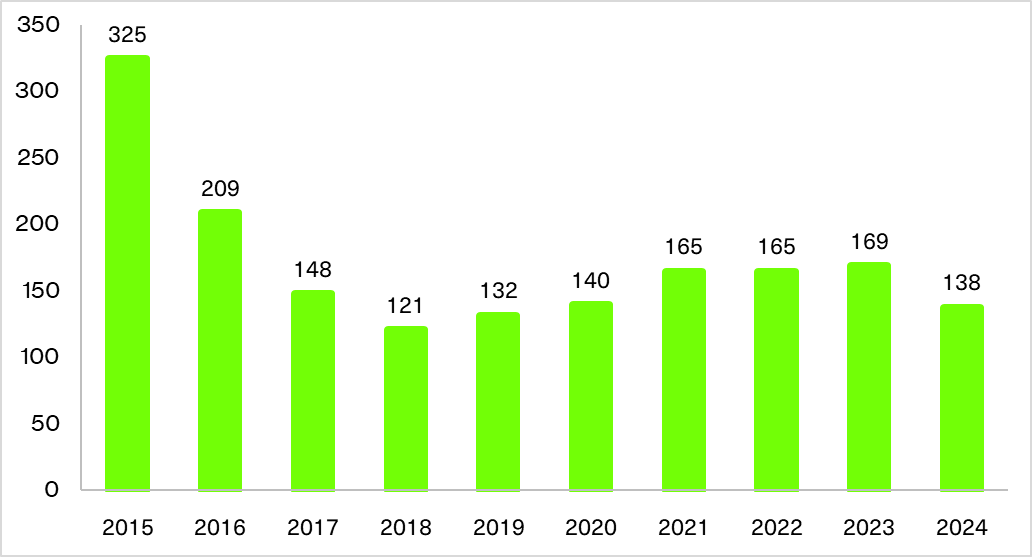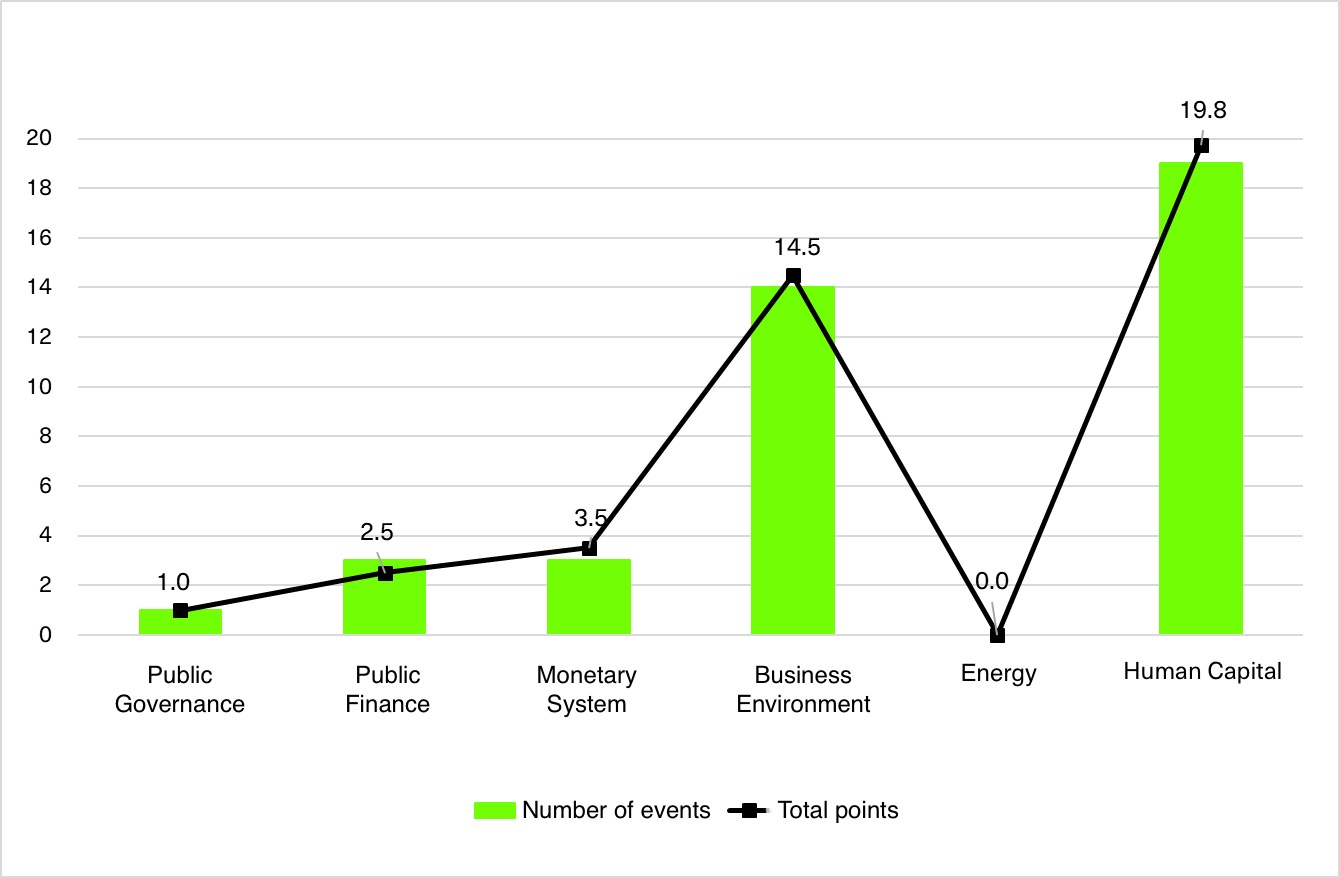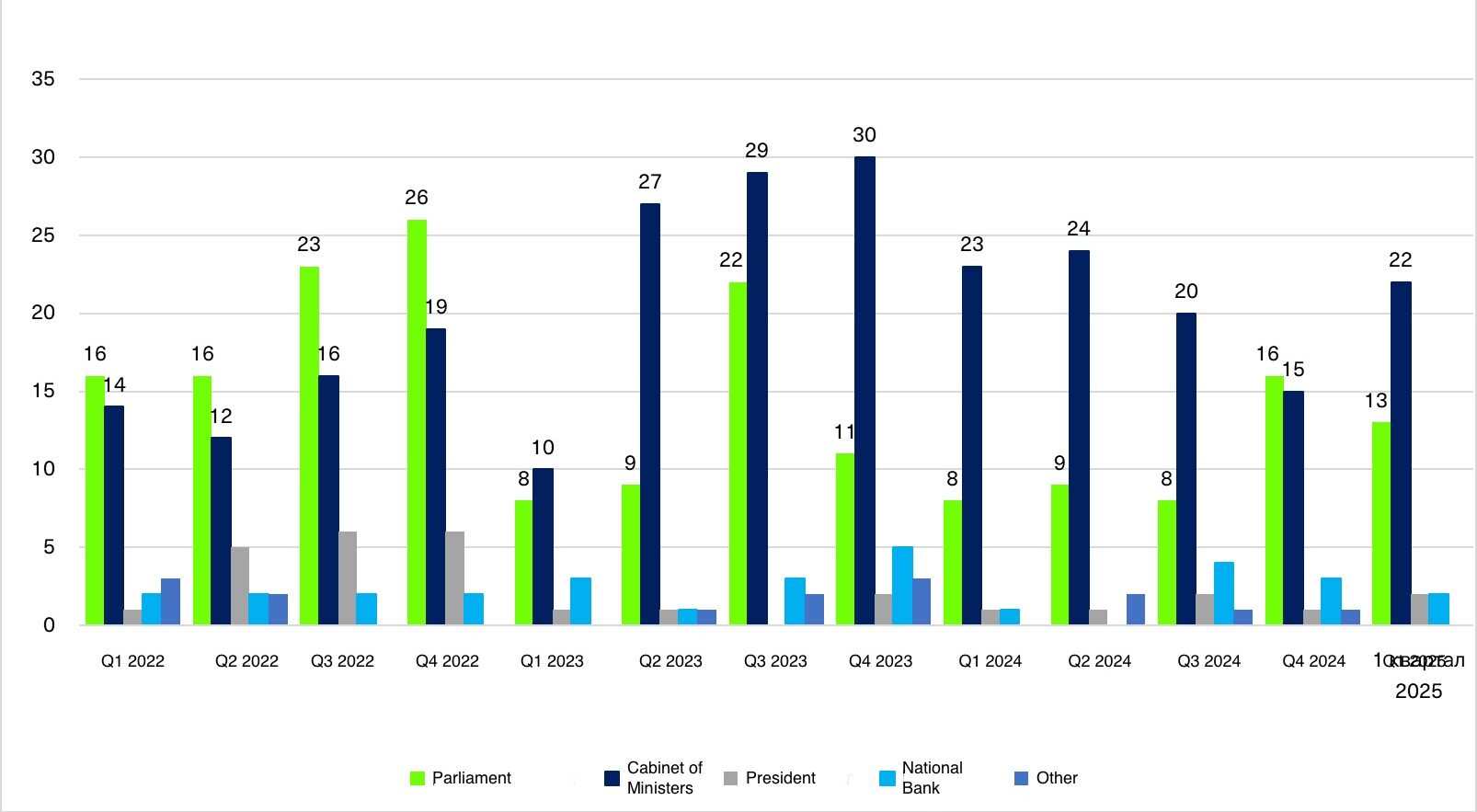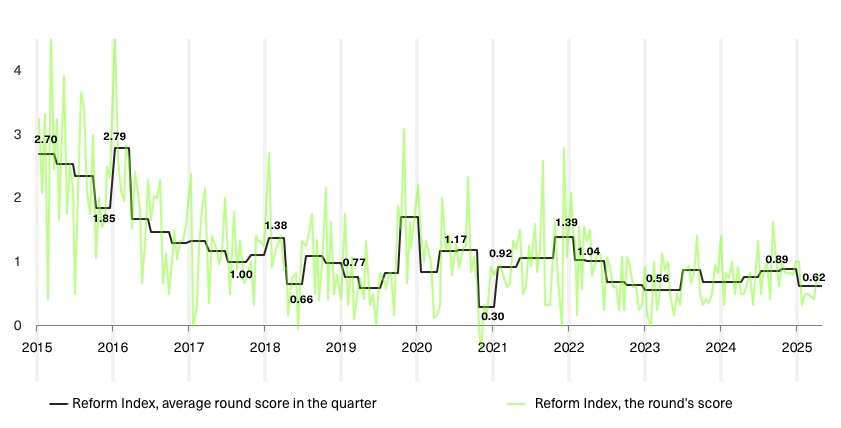To secure EU accession by 2030, Ukraine must fulfill at least a “minimum plan” — adapting its legislation to EU requirements. In the first quarter of 2025, Oleksandr Korniyenko, the First Deputy Speaker of the Verkhovna Rada, stated that approximately 500 to 700 laws and regulatory acts would need to be amended. However, it is likely that lawmakers will have to go significantly further, as European legislation will also change over the next five years. Moreover, the challenges of war, reconstruction, and the pursuit of widespread digitalization will demand a large volume of new regulation — an area in which Ukraine must take the lead as a developer and pioneer rather than simply following existing solutions.
To achieve the stated goal, the government will need to somewhat step up its efforts. Since Ukraine was granted EU candidate status in June 2022, it has not managed to make a breakthrough — the pace of reform has remained steady.
Chart 1. Number of reforms in the Reform Index database by year

Source: Based on data from the Reform Index
The first quarter of 2025 brought no real change either. During this period, we recorded 39 regulations that could be considered either reforms or counter-reforms. This is nearly the same as in the previous two quarters when we counted 35 reforms each.
Among the most notable developments of the period are four regulations that received a score of +2 (on a scale from –5 to +5) from the Reform Index experts.
Included in this group is Law No. 4154-IX, which updates the approach to subsoil resource development. “In the past, the focus was primarily on energy resources — particularly oil and gas — but now policy is shifting toward minerals of strategic and critical importance,” explains Roman Nitsovych, Research Director at DiXi Group. Licenses for extracting strategic minerals (crucial for the country’s economic development) and critical minerals (essential for development and in short supply) will be allocated through electronic auctions. These auctions will be open to companies from Ukraine, OECD member states, and countries with which Ukraine has signed cooperation agreements on mineral resources — such as EU member states and the United States.
An important change has taken place in the pharmaceutical market — Law No. 4239-IX, which simplifies drug registration and introduces new pricing rules. First, the law establishes a State Register of Medicinal Products. According to Inna Maslenchuk, an expert in pharmaceutical provision and healthcare financing, this “will make it possible to track all information about a drug — from its composition and manufacturer to its registration status. This measure increases transparency, facilitates quality control, and reduces opportunities for counterfeiting.” Second, Ukraine will introduce a National Drug Price Catalogue to which manufacturers and importers must submit their prices. A key restriction is that the listed price cannot exceed the arithmetic average of the three lowest prices for the same medication in reference countries defined by the Ministry of Health. The list of drugs in the catalogue will be updated monthly, and prices will be reviewed every six months. Pharmacies are prohibited from selling medicines that are not included in the catalogue or priced above the listed amount. Third, the law simplifies state registration of medicines procured by the state enterprise Medical Procurement of Ukraine that are registered in the United Kingdom, as well as drugs from the PEPFAR database, those with temporary FDA approval, or those included in WHO prequalification lists. Previously, simplified registration applied only to drugs registered in the United States, Switzerland, Japan, Australia, Canada, and EU countries or under the EU centralized procedure.
Cabinet Resolution No. 279 also received a high rating from the Reform Index experts. It allows the state to transfer weapons design documentation to private manufacturers if state-owned enterprises are unable to meet the required production volumes. A key benefit of this decision is the ability to rapidly scale up the production of necessary weapons or components and to involve multiple contractors to reduce the risk of supply disruptions. However, the resolution also carries risks — namely, the need to prevent the leakage of state secrets and to ensure that manufacturers do not use the transferred blueprints and documentation to create their own products.
An important change has taken place in the education sector: thanks to Law No. 4265-IX, Ukrainians returning from abroad will be able to have their educational achievements obtained overseas officially recognized. This applies to both formal and non-formal education, such as courses, webinars, workshops, and similar formats. Dmytro Yarovyi, Associate Professor at the Kyiv School of Economics, notes that while “this law does not directly encourage people to return to Ukraine, it at least — provided it is properly implemented — removes one of the factors that discourage return and gives parents and children more room to make informed decisions.”
At the same time, in the first quarter of 2025, we also recorded one counter-reform: Cabinet Resolution No. 168, which sets maximum markups on medicines. “For over-the-counter drugs, the markup may not exceed 35% of the purchase price; for prescription drugs, a separate regressive scale has been introduced. Distributor markups must not exceed 8% of the wholesale price,” explains Oksana Kuziakiv, Chief Executive of the Institute for Economic Research and Policy Consulting (IER). Why is this considered a counter-reform? It could drive smaller players out of the market — such as rural pharmacies with a limited customer base — if the capped profits are insufficient to cover their operating costs.
All Reform Index expert assessments of regulatory acts can be found at the following link.
Progress by Reform Index areas
In the first quarter of 2025, the greatest progress was recorded in two areas — Human Capital and Business Environment — which accounted for 19 and 14 new regulations, respectively. The aforementioned law on new drug pricing rules falls under both of these categories. In Public Governance, there was one notable development: Law No. 4264-IX, which establishes the Specialized District Administrative Court and the Specialized Administrative Court of Appeal. Three changes were also recorded in the areas of Public Finance and Monetary Policy. In the Energy sector, no changes were observed.
Chart 2. Total event scores by area, Q1 2025

Source: Issues 255–261 of the Reform Index.
Note: The law on new drug pricing rules falls under two sectors — Business Environment and Human Capital. As a result, while the total number of events is 39, their sum in this chart is 40.
Human Capital
Among the 19 changes in Human Capital were seven Cabinet resolutions and 12 laws, eight of which were initiated by Parliament, three by the Cabinet of Ministers, and one by the President.
Healthcare remains the key focus of reform. In the first quarter, Law No. 4068-IX on tactical pre-hospital care was adopted. It establishes a legal framework for the work of combat medics who do not have specialized medical education.
Law No. 4223-IX on the mental health care system introduces a framework for continuous professional development and certification of specialists. It establishes unified certification standards for psychologists (by the newly established National Commission on Mental Health) and for psychotherapists (through self-regulatory organizations with international recognition). However, the law’s practical impact will depend on how it is implemented. As Zamira Saidova of the Ukrainian Association of Psychologists explains, psychologists have raised several concerns: “Will this lead to market monopolization? Will continuing education for psychologists become a profit-making tool for those providing it? How transparent will the certification and international accreditation procedures be? In addition, there is ongoing concern about potential corruption within the National Commission on Mental Health, which will certify professionals and maintain the Register of Self-Regulatory Organizations in the mental health sector.” The law also calls on employers to develop and approve workplace psychosocial support programs for employees.
Another law — No. 4246-IX — establishes mandatory continuous professional development for all healthcare workers. Under this law, professional standards for healthcare occupations are approved by the Ministry of Health following their endorsement by the National Federation of Healthcare Trade Unions.
Law No. 4203-IX strengthens oversight of organ transplantation. It prohibits the removal of anatomical materials for transplant from orphans, legally incapacitated individuals, and those who died as a result of Russia’s armed aggression against Ukraine. A National Transplantation Committee is to be established under the Ministry of Health; it will review adverse transplant reactions, determine emergency transplant statuses, and handle complaints. The law also standardizes the practice of “domino” transplantation, in which an organ or other material from a deceased donor is transplanted to a first recipient. If an organ is then removed from that recipient, it may be transferred to a second recipient — who does not necessarily have to be a close relative of the first.
A number of changes took place in the social sector. The government launched a pilot project to replace social assistance based on the subsistence minimum with a basic social benefit, which is calculated from a fixed amount set by the government — currently UAH 4,500. The program will begin on July 1, 2025, and its initial beneficiaries will include low-income and large families, single mothers, and children whose parents evade child support payments. Not all recipients will be eligible for the full amount. For example, pensioners with 32 years of insurance record will receive the full sum; those with 30 to 32 years will receive 88% (UAH 3,960), while pensioners with less than 10 years of service will receive the least — 53% (UAH 2,385). Thanks to Law No. 3999-IX on the social protection of children affected by Russian aggression, such children are now entitled to assistance tailored to their individual needs — such as psychological rehabilitation, shelter, and counseling. They will also receive compensation for harm to health and life, free medical care, and services related to recovery and recreation.
Several changes concern people with disabilities. Law No. 4219-IX expands their employment opportunities, allowing them to work in any position that is not explicitly contraindicated due to their health condition. The law provides for social support in the workplace: for example, a person with a disability may engage a personal assistant or a sign language interpreter. It also allows for the involvement of private employment agencies specializing in placing people with disabilities and allocates funding for their education and retraining. The state will support employers who hire people with disabilities through mechanisms such as compensation for workplace adaptations, benefits, and subsidies. Employers who, for certain reasons, are unable to hire people with disabilities will be required to pay a targeted contribution to a fund supporting their employment. For individuals who acquired a disability due to the war, as well as for combat veterans, Law No. 4157-IX provides additional social protections — including the right to early retirement for people with war-related disabilities in these categories (for women at age 50 with 20 years of insurance record, and for men at age 55 with 25 years of insurance record).
Regulations in this area also addressed accessibility and safety issues. Under a Cabinet decision, the results of annual accessibility monitoring will be entered into the Register of Buildings. Representatives of organizations of persons with disabilities, as well as certified accessibility specialists, may be involved in the monitoring process. To qualify as an accessibility specialist, an individual must hold at least a bachelor’s degree in Architecture and Urban Planning or in Civil and Structural Engineering and possess a certificate of competence in accessibility obtained through professional development. The government also sought to address the issue of restricted access to bomb shelters through Law No. 4200-IX, which introduces administrative and criminal liability for failure to properly equip shelters or for denying access to them. If a person is denied entry to a shelter during an air raid and this results in injury or death, criminal liability will apply.
Efforts to counter the consequences of Russia’s actions in the cultural sphere were reflected in two decisions during the first quarter. Law No. 4261-IX ratified the Council of Europe Convention on Offences Relating to Cultural Property in Ukraine. Once the provisions come into force, criminal liability will apply for the destruction of cultural heritage and the theft of cultural artifacts, though amendments to Ukraine’s Administrative and Criminal Codes will still need to be adopted. Another critical step in countering hostile cultural influence was the Cabinet of Ministers’ decision on the procedure for using the special broadcasting system, which is designed to block television and radio signals from Russia, Belarus, and Transnistria within Ukraine. The measure primarily targets border regions, including the Volyn, Rivne, Zhytomyr, Kyiv, Chernihiv, Sumy, Kharkiv, Vinnytsia, Donetsk, Zaporizhzhia, Mykolaiv, Kherson, and Odesa regions.
Business Environment
In this area, 14 changes occurred during the first quarter, including eight laws (four initiated by MPs, three by the Cabinet of Ministers, and one by the President) and six Cabinet resolutions.
As in the Human Capital sector, we recorded several changes in the Business Environment regulation that targeted the healthcare field — specifically, the pharmaceutical market. One such change is a resolution amending the procedures for the parallel importation of medicines. It stipulates that drugs may be imported into Ukraine as parallel imports based on a permit issued by the State Service on Medicines and Drugs Control and a certificate of quality issued by the manufacturer in the exporting country. This mechanism allows for the import of medicines not registered in Ukraine. Upon entry, the medicines are subject to visual inspection and verification of storage conditions during transport. If problems are detected during the inspection, the drugs must undergo laboratory testing.
To prevent crises in access to medicines, the Cabinet of Ministers will be able to grant Ukrainian manufacturers permission to produce drugs without the patent holder’s consent, provided that the patent holder receives compensation. However, this option may only be used “under conditions of a state of emergency or quarantine, if the patent holder is unable to meet Ukraine’s demand for the drug, which could lead to a shortage of at least 51% [of the national need] over a six-month period,” explains Ilona Sologoub, Scientific Editor at Vox Ukraine.
On the other hand, the government has initiated a law to strengthen control over the production and circulation of dietary supplements. The Ministry of Health is to approve a list of permissible doses of vitamins, minerals, and other substances in supplements to prevent manufacturers from marketing them as medicines, thereby bypassing the formal drug registration process. Violations of the regulations governing the sale of dietary supplements will be subject to fines. For example, individual entrepreneurs who provide false information will be fined 40 minimum wages (UAH 320,000), while legal entities will face a fine of 55 minimum wages (UAH 440,000). Supplements produced under the previous rules may continue to be sold for three years after the law comes into force, which is expected at the end of September 2025.
Several targeted changes took place in the first quarter. In particular, Parliament adopted a law requiring that all state-owned commercial or state-run enterprises (except those undergoing bankruptcy, for which a six-month period applies following the conclusion of the procedure) must, within six months of the law’s entry into force, be transformed into state-owned joint-stock companies, limited liability companies, non-profit entities, or be liquidated. For municipal enterprises, such restructuring remains voluntary for now. In addition, state-owned enterprises are now required to publish financial statements, which will contribute to greater transparency in management.
Some changes also took place in the construction sector. Previously, only applications for the construction of small residential buildings submitted via the Diia platform were processed automatically. Now, the same approach will apply to documents submitted through Administrative Service Centers. Architect Olena Pitirimova notes that some approaches in the regulation require improvement: “The provision stating that documents for commissioning completed buildings ‘must be submitted in electronic form, formatted in a way that allows their content to be understood’ does not clearly indicate in what format the documents should be submitted. It would be better to define the document format more specifically. The regulation also provides for the random selection of 1 in 10 declarations for review to check for errors. However, it would be more effective to implement automated checks of all declarations to minimize the risk of systemic mistakes.”
Regulation in the advertising sector is becoming stricter — businesses are now required to obtain a permit to place outdoor advertisements. This measure is intended to ensure that advertising does not harm cultural heritage sites, interfere with engineering infrastructure, or violate road safety regulations. It will also help clarify who has the right to place advertisements in a specific location when multiple organizations intend to advertise in the same space.
Who is the biggest reformer?
The main reform driver of the first quarter was the Cabinet of Ministers, which accounted for the majority of reforms during this period — 22 out of 39. These included 15 resolutions and seven laws. Another 13 reform-oriented laws signed by the President in the first quarter were submitted by MPs, while two originated directly from the President: the aforementioned ratification of the convention on criminalizing offenses against cultural heritage and the ratification of the Protocol to the INTERBUS Agreement on the international occasional carriage of passengers by coach and bus. During this period, the National Bank of Ukraine adopted two reform-related resolutions: one allowing government bond (OVDP) auctions with the simultaneous exchange of bonds from a different issuance, and another establishing new requirements for insurance intermediaries.
Graph 3. Distribution of adopted reforms by initiating body

Overall, in the first quarter of 2025 compared to the previous quarter:
- The number of reforms slightly increased — from 35 to 39;
- The average round score dropped further — from 0.9 to 0.6 on a scale from –5 to +5;
- The average score per event declined from 1.2 to 1.1.
Chart 4. Average quarterly Reform Index score

Source: Issues 1-261 of the Reform Index
In the first quarter of 2025, the government focused its attention on reforming the pharmaceutical sector. Several changes also took place in the area of social protection. However, when looking at the broader reform landscape, this quarter did not bring us much closer to our goal of joining the European Union. While addressing the immediate challenges of a country at war — particularly in the social and healthcare sectors — we must also stay focused on long-term objectives. So far, it is difficult to say that Ukraine’s policymakers are managing to do so.
Attention
The author doesn`t work for, consult to, own shares in or receive funding from any company or organization that would benefit from this article, and have no relevant affiliations



